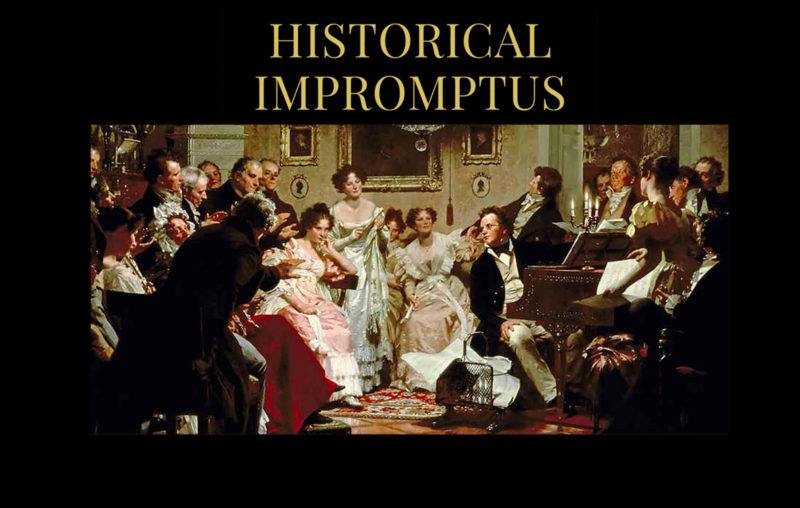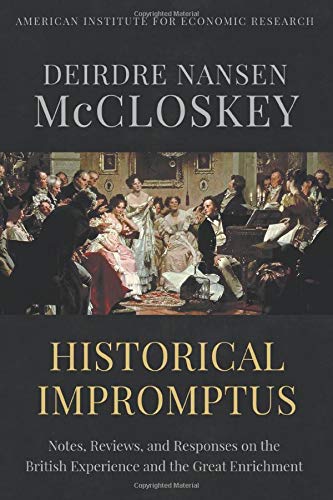The Inestimable Wisdom of Deirdre McCloskey

Deirdre McCloskey does not pull her punches, nor does she discriminate in her new book Historical Impromptus, a book where she takes on everyone from Karl Marx to Adam Smith. As expected for a professor who teaches four different subjects her book engages a number of topics that include but are not limited to international trade, the origins of wealth, monetary policy, agriculture, peasant behavior, economic development, and the breeding habits of rich people.
It is a truly interesting book that consists of 368 pages of essays that at first seem a bit eclectic but eventually come together to form a coherent picture. That is as advertised, a commentary on British economic history which holds key universal lessons, an explanation of the Great Enrichment, and a stalwart defense of liberalism packing an economic reality check for doomsday alarmists.
McCloskey’s discussion on British economic history alternates between providing highly specific details on industrial performance and broader discussions about the experience of humanity. The passages read almost like a conversation as she responds to a variety of different scholars, intricately applying and refuting their writings. Intertwined with her oddly specific and niche discussions about the variations in size of coal mine shafts and the performance of cotton mills are some profound observations about history. One of her most important is the refutation of some commonly held economic fallacies.
The first fallacy is the idea of a British economic decline, to which she asks a decline to what? She cites various explanations for a perceived fall from grace during the late Victorian era such as misallocations of capital. If only British businessmen invested more at home than in Canadian railroads, she playfully mocks, or perhaps Parliament should have banned all investment abroad. These faulty hypotheses not only advocate for a zero-sum view of prosperity but as McCloskey hammers on in her book, there was no economic decline. Some countries just grew a little faster and fast economic growth is easier at the bottom than it is at the top.
The scholars she criticizes cited the superior economic growth of Gilded Age America and Germany as proof of Britain’s decline. However, they forgot that the rest of the world was far poorer by an order of magnitude. Instead of being the best economy in the world, now Britain was only in the top five; what a shame! At the same time as America and Germany got rich, they contributed to the overall wealth and prosperity of the world. Economic growth is mutually beneficial, not a competition with winners and losers.
Clearly, she did not mean to address this point simply to gain intellectual brownie points; these same characters still exist today in different forms and advocate for what is essentially economic nationalism. They do not realize that variance in economic growth is fine, that in the grand scheme of things we are richer than ever before, that prosperity elsewhere adds and not detracts from our overall well-being.
Another very important lesson McCloskey provides in her book is the nature of prosperity. Contrary to what many would like to believe, imperialism and world domination were not good for the average Briton. You cannot oppress your way to prosperity or else North Korea would be the richest country in the world. Free enterprise, trade, and the liberal ideals of The Enlightenment is what created the wealth they had and still have today.
If anything the British may have been better off had they not conquered half the world and instead focused on being a free-trading nation. Save for having cool stolen artifacts and a map of the world painted in red, what good did any of this do for the average British citizen? British tax dollars were being siphoned off to pay for constant military campaigns, and goods imported from abroad were paid for in blood.
The real driver of growth rested in the free citizen, the ability to conduct commerce, to trade freely, to invent and innovate, to compete in the open marketplace. One does not need any more proof than to look at modern-day Britain. A mere shadow of its former self geographically, but wealthier by orders of magnitude. In an increasingly globalized world that embraces free enterprise we see the results everywhere we look.
McCloskey provides evidence that the average global GDP per capita from 1820 to 1992 increased by a factor of almost 800%. For countries like the United States that fully embraced liberal values that number is closer to 1600%. Countries like Russia, with greater size and natural resources, pales in comparison because its people are not free. Prosperity is furthered when more and more people are able to participate in the marketplace and when they can bring their talents and ideas to the world.
The second part of McCloskey’s book touches on the Great Enrichment, which is the current time period that we are so fortunate to inhabit. For the majority of human existence and by our natural condition, abject poverty was the state of man. Then within the past few hundred years, wealth generation and prosperity began to skyrocket. In this portion of her book she seeks to compare a diverse array of ideas and offer her own hypothesis. Much like the section on British economic history, McCloskey has a timeless lesson for the reader that is highly relevant today.
The section concerning the Great Enrichment is especially interesting because it attempts to answer a profound and noble question: how did humanity become rich and how can more societies become rich?
Some people, like Karl Marx, would assert that humanity became rich when exploitation of labor became profitable. On page 266 she quotes Marx and Engels when they write “the bourgeoisie, during its rule of scarce two hundred years, has created more massive and colossal productive forces than have all the preceding generations together.” The latter part of that statement is certainly true as the bourgeoisie has gone on to create more and more productive institutions; the former, not so much. As she explains in a different paper:
“Taking by exploitation from slaves or workers results merely in more such fruitless capital accumulation, if it does, and is anyway is unable to explain a great enrichment for even the exploited in the magnitude observed, absent an unexplained and massive innovation.”
Another school of thought she tackles is social-Darwinism espoused by Gregory Clark in his book ‘A Brief Economic History of the World.’ McCloskey summarizes his point that prosperity became more widespread because rich people were eventually able to spread their values throughout society because they could breed more and survive longer. Eventually, values that were necessary for a prosperous commercial society became more and more widespread. McCloskey quotes Clark’s writing on page 302 which says, “England’s advantage lay in the rapid cultural, and potentially also genetic, diffusion of the values of the economically successful through society.”
Besides being flirtatious with eugenics, this cannot be true either as the rich and the poor have enjoined massive gains in wealth. Furthermore, countries like China and India within the same generation have gone from abject poverty to economic powerhouses. This theory does, however, raise good points about the necessity of certain values that make commercial society possible. She touches on this later in the book.
McCloskey then moves on to analyze and engage with ideas that could certainly play a role but she does not see as the main causal factor. On page 280 she cites the theory of endogenous growth which argues that purely economic factors such as population and urbanization lead to prosperity. Then there is exogenous growth which posits that outside factors such as technological transfers lead to growth. Perhaps it was the harnessing of fossil fuels cited on page 319? All of these are helpful but nowhere near causal.
The great Adam Smith and his theory that accumulation of capital produces wealth must be the linchpin, right? Or maybe John Stuart Mill’s view that savings from globalization created the investments necessary for prosperity? On page 295 McCloskey asserts that these are all fantastic things to have but they are not the root cause of the Great Enrichment and widespread growth. Necessary but not sufficient for prosperity.
The root of the Great Enrichment and the prosperity that we see increasingly around the world is the spread of ideas. Ideas encompassing the general sentiment towards commerce, the dignity of individuals, and the value of liberty that are attributed to the Dutch Golden Age. McCloskey on page 325 writes that
“If capital accumulation or the rule of law had been sufficient the Great Enrichment would have happened in Mesopotamia in 2000 B.C… Why did it all start at first in Holland about 1600 and then in England about 1700… The answer, in a word, is liberty. Liberated people it turns out are ingenious.”
When people embrace the ideas of political and economic freedom, they are free to innovate, to compare ideas, to compete in the marketplace. A society that embraces what she calls “bourgeois values” is a society that can unleash the potential of its people. It was not capital attainment or worker exploitation or institutions like common law. It was as she writes
“Ideas from and about the bourgeoisie — by an explosion after 1800 in technical ideas and a few institutional concepts, backed by a massive ideological shift toward market-tested betterment.”
This shift in values is what ultimately leads people to prosperity. Embracing the values of entrepreneurship and enterprise, individual worth, and responsibility. A country could have all the capital in the world and the best institutions and still get nowhere. If the people themselves do not value the core principles of liberty, of permissionless innovation, of mutual respect, and self-responsibility, then prosperity will be scarce. People certainly need proper institutions and capital to generate wealth. But it is the ideas and values that define a society that determines if they will be put to good use.
McCloskey writes in a separate paper
“What made us free and rich was the questioning of the notion that ‘a liberty’ was a special privilege accorded to a guildsman of the town or to a nobleman of the robe, and the supporting notion that the only ‘dignity’ was privilege inherited from such men and their charter-granting feudal lords.”
Breaking down barriers not only institutionally but socially, and allowing more people to strive for their potential is what started the engine of comprehensive economic growth. Economic and social freedom that rests not only in regulatory codes but in the hearts of men.
Deirdre McCloskey separates her book into two sections: one on British economic history and one on the Great Enrichment, but they come together to form one coherent message. Standing out from the oddly specific essays about agriculture and canal construction, monetary policy and financial practices are a persuasive prescription for economic and social liberty. She assures us that the principles of free trade, of global cooperation, of commercial enterprise and individual dignity will continue to bring the blessings of prosperity to more and more human beings.
We should ignore the siren songs of socialism, fascism, economic nationalism and embrace a culture that allows people to as she says “have a go.” In other words, a free and open society that embraces bourgeois values. If we do this we will not only continue the economic and social miracle that many of us are so blessed to be a part of but extend it to others who are less fortunate.











